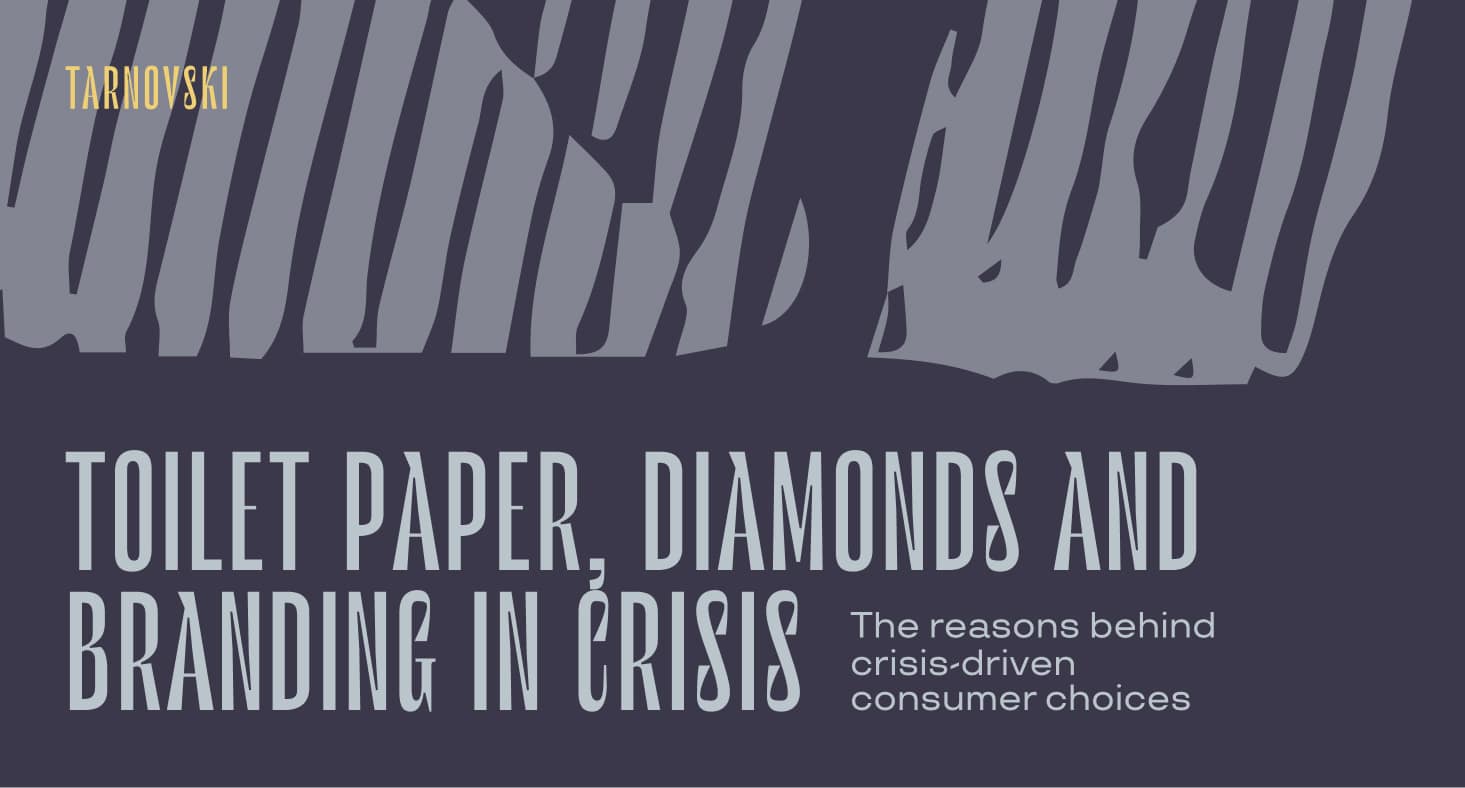Summary
- Panic buying in crisis - What products have people chosen at the beginning of this crisis?
- Consumer's relationship with the product - What determines the consumer's attitude towards a product? The process of reasoning.
- The power of symbols - Why does a commodity have the power to influence the consumer's social status? How to bypass too much reasoning and maintain the consumer's interest? What brands have higher chances to overcome this crisis?
Panic buying
At the beginning of each crisis, many voices emerge, especially among experts, who tell us clearly: people will optimize their spending. Analysts predict that people will give up on any purchases other than their primary needs. Moreover, they will choose cheaper products or, at least, products with the most advantageous price & quality ratio. In short, each one will activate a kind of "safe mode" buying.
What these experts say is that, in times of crisis, people will suddenly become more rational, they will be guided only by an instinct of efficient survival, without giving too much importance to other needs, such as needs of self-affirmation. Consumers will carefully weigh all their actions, think them through, to save and gain more resources - both material and emotional.
Based on these estimates, it would be natural to assume that due to this change in consumers' behaviour, the medium, premium and luxury categories would register a sales decline. We exclude the ultra-luxury because it is a special category, in which there aren't any major fluctuations.
So, let's take a look at the consumers' behaviour at the beginning of this crisis. The mass media generated a worldwide phenomenon of panic buying. And a lot of jokes about it, especially about toilet paper and bottled water.
What these experts say is that, in times of crisis, people will suddenly become more rational, they will be guided only by an instinct of efficient survival, without giving too much importance to other needs, such as needs of self-affirmation. Consumers will carefully weigh all their actions, think them through, to save and gain more resources - both material and emotional.
Based on these estimates, it would be natural to assume that due to this change in consumers' behaviour, the medium, premium and luxury categories would register a sales decline. We exclude the ultra-luxury because it is a special category, in which there aren't any major fluctuations.
So, let's take a look at the consumers' behaviour at the beginning of this crisis. The mass media generated a worldwide phenomenon of panic buying. And a lot of jokes about it, especially about toilet paper and bottled water.
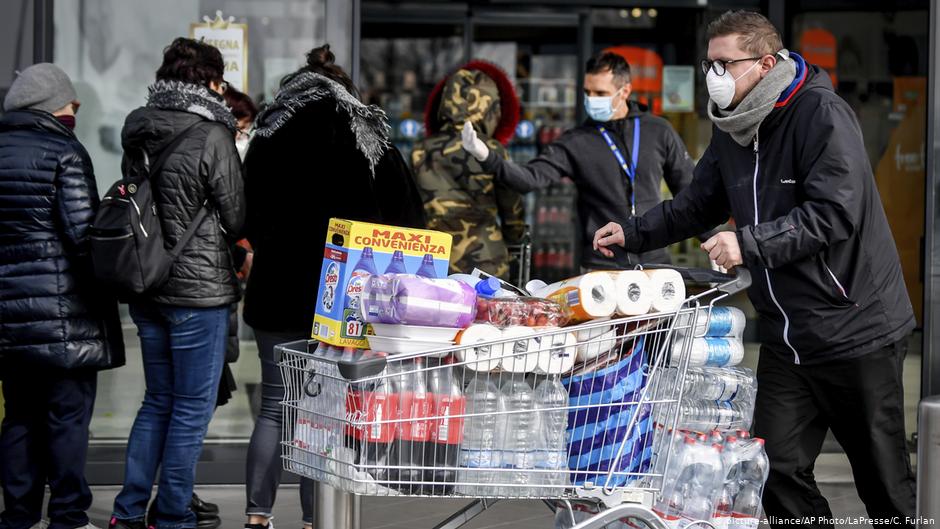
Why these products?
Bottled water and toilet paper can be categorized as necessities. That is, goods that, theoretically, correspond to primary needs, according to Maslow, in other words - products indispensable for survival. The question remains open - why were these two products so popular? Why not rice, frozen meat, canned fish or tomatoes?
Bottled water
Nowadays, the hygienic norms are more and more rigorous, the reason why, in most civilized countries, tap water is drinkable and suitable for daily consumption. However, at the beginning of the quarantine, most customers chose to buy huge amounts of bottled water. A choice which does not seem reasonable, since the average price of affordable bottled water would start at about 0.18 euros per litre, while tap water would be around 0.0008 euros per litre. That means that bottled water is around 222 times more expensive than tap water.
Toilet paper
Regarding the toilet paper, it is clear that alternatives, such as newspapers or already read books - are not the most pleasant options, so it seems to be a primary necessity. However, the quantities that people bought were extremely exaggerated. Many of them bought supplies for months in advance, although the quarantine period announced in most countries varied from 2 to 5 weeks. Again, it doesn't seem like a very rational purchase.
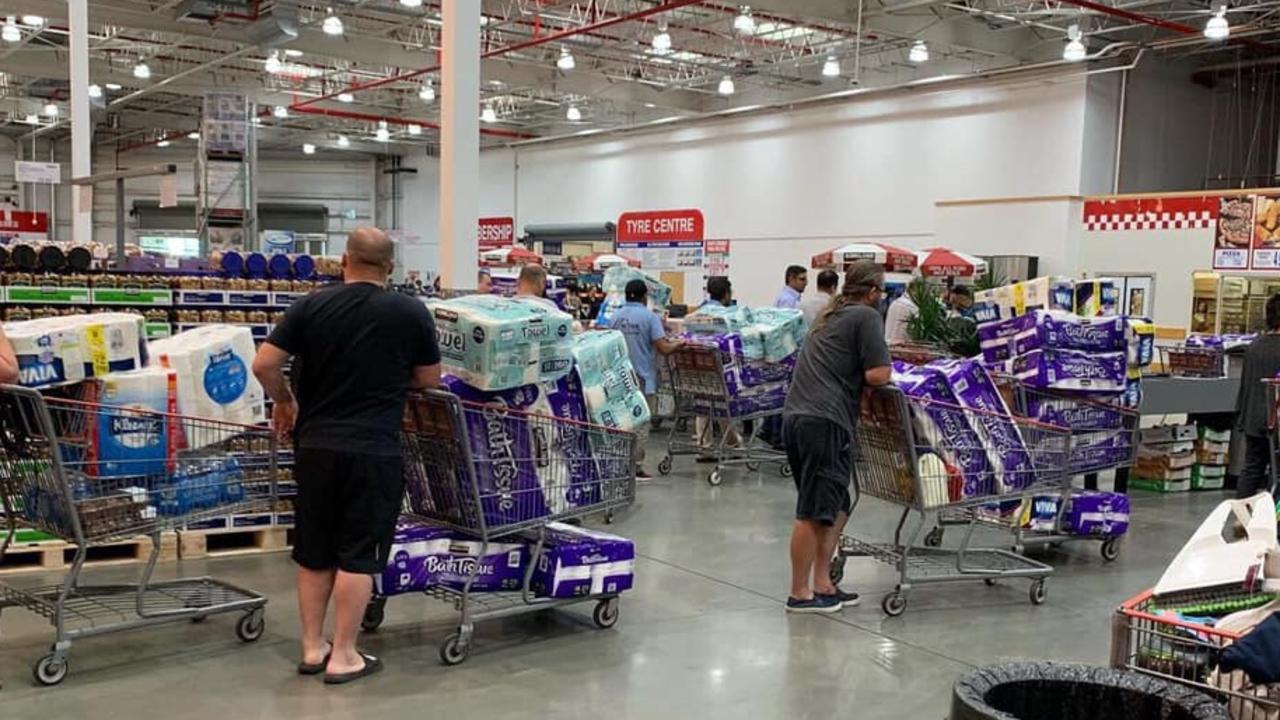
Could we find the answer in the products' history?
In the West, at the end of the 19th century, toilet paper was produced initially as a product accessible only to the elites. It became more accessible, therefore a commodity for the average citizen, only after the Second World War. I mean, in my grandparents' childhood, this was a rare and premium product. So we have a maximum of about 3 generations of somewhat "loyal" users of toilet paper. Especially since in Post-Soviet states, it was difficult to buy toilet paper and it was always used "wisely". I mean, after all, it wasn't a commodity in our area yet.
Same for the bottled water. It hasn't always been a commodity. Bottled water began to be produced en masse for around 50 years max, and it has become accessible even more recently, not to mention that bottled water's popularity is due to Perrier. A brand that made drinking bottled water seem "sexy", premium and having healing effects.
In other words, these two products, in terms of availability and price, have only recently become a commodity. But it's not the same in our minds. Because, like any other habit, it will take us some time to mentally re-categorize them from the "affordable premium" to "true commodity".
We have thus far: on the one hand, we hypothesize that spending on non-essential goods, medium and premium goods will decrease. Also, goods with a more cost-effective analogue will be replaced. On the other hand, we buy huge volumes, maybe even irrational, of products cheaper in absolute numbers, but pretty expensive compared to their alternatives or level of importance (0.18 euros per litre of bottled water vs 0.0008 euros per litre of tap water). This contradiction raises a legitimate question:
Same for the bottled water. It hasn't always been a commodity. Bottled water began to be produced en masse for around 50 years max, and it has become accessible even more recently, not to mention that bottled water's popularity is due to Perrier. A brand that made drinking bottled water seem "sexy", premium and having healing effects.
In other words, these two products, in terms of availability and price, have only recently become a commodity. But it's not the same in our minds. Because, like any other habit, it will take us some time to mentally re-categorize them from the "affordable premium" to "true commodity".
We have thus far: on the one hand, we hypothesize that spending on non-essential goods, medium and premium goods will decrease. Also, goods with a more cost-effective analogue will be replaced. On the other hand, we buy huge volumes, maybe even irrational, of products cheaper in absolute numbers, but pretty expensive compared to their alternatives or level of importance (0.18 euros per litre of bottled water vs 0.0008 euros per litre of tap water). This contradiction raises a legitimate question:
How come we have such a special relationship with certain products?
What happens when a new product category appears? Usually, everything starts with framing: defining the limits of the category, what the utility consists of, what necessity it covers etc. For example, when minivans appeared on the market, manufacturers began by explaining as clearly as possible to potential customers how they should understand this new product: a versatile urban car for families who need a spacious, modular interior with large storage spaces, but with small outer dimensions, suitable for daily commutes.
The same happened with bottled water and toilet paper. At the beginning of their mass production, the manufacturers highlighted several clear product features and explained how these products should be perceived. In other words, consumers were given clear benchmarks through which they could evaluate and appreciate each product against the "standard" of its category and the category itself. And, as both products were initially positioned as "premium", we still perceive them by inertia as more "special" commodities, with a special status. If we look at it more trivially, we can frame this as a "positioning" activity, an important ingredient in their success, but not the main one.
The same happened with bottled water and toilet paper. At the beginning of their mass production, the manufacturers highlighted several clear product features and explained how these products should be perceived. In other words, consumers were given clear benchmarks through which they could evaluate and appreciate each product against the "standard" of its category and the category itself. And, as both products were initially positioned as "premium", we still perceive them by inertia as more "special" commodities, with a special status. If we look at it more trivially, we can frame this as a "positioning" activity, an important ingredient in their success, but not the main one.
Toilet paper - the new diamond?
Ever since mankind, gold has been considered a main attribute of wealth. A symbol of status, abundance, power, eternity and achievements. And if anyone tries to convince you that in our modern times, things are not the same - remind them that to this day, in all competitions, the most valuable prize is the gold medal - a symbol of achievement. Just like the marriage certificate is accompanied by an exchange of wedding rings made of precious metal, mostly gold. And, of course, these aspects, this symbolic power, also influences the price of gold itself.
The twentieth century shows us that even in more recent times it is possible to build a special relationship with some inanimate objects. The price of diamonds, as well as that of precious metals or oil, fluctuates depending on the state of the economy, the possibilities of buyers etc. But since the 1940s, after the famous campaigns of the giant De Beers, the diamond has been transformed from superior quality material, into an idea, a concept, a sign of boundless love. An object without any utility or major importance for the ordinary citizen has become a necessary attribute for expressing one's purest feelings towards another.
The modern man lives in far more superior security conditions than his ancestors of 100 years ago. Not to mention the political power that any citizen can have in most countries now, in the age of the Internet. So, gradually, as a civilization, we stopped needing material objects to symbolize the abundance of power. Instead, we started to put more value on everything that shows that we are modern, we are keeping up with the world - a way of saying "I'm a civilized man, I can adapt quickly, so I'll survive". Drawing a parallel with the animal world - we changed the massive and colourful plumage to elaborate dances and melodic voices. We replaced the symbolic power of physical attributes - gold or diamonds - with new, often abstract ones.
These signs of the "civilized man", however, are not limited to the devices you have or the technologies one uses for communication or work. There are also much more subtle and less obvious clues, e.g. what water do you drink.
The twentieth century shows us that even in more recent times it is possible to build a special relationship with some inanimate objects. The price of diamonds, as well as that of precious metals or oil, fluctuates depending on the state of the economy, the possibilities of buyers etc. But since the 1940s, after the famous campaigns of the giant De Beers, the diamond has been transformed from superior quality material, into an idea, a concept, a sign of boundless love. An object without any utility or major importance for the ordinary citizen has become a necessary attribute for expressing one's purest feelings towards another.
The modern man lives in far more superior security conditions than his ancestors of 100 years ago. Not to mention the political power that any citizen can have in most countries now, in the age of the Internet. So, gradually, as a civilization, we stopped needing material objects to symbolize the abundance of power. Instead, we started to put more value on everything that shows that we are modern, we are keeping up with the world - a way of saying "I'm a civilized man, I can adapt quickly, so I'll survive". Drawing a parallel with the animal world - we changed the massive and colourful plumage to elaborate dances and melodic voices. We replaced the symbolic power of physical attributes - gold or diamonds - with new, often abstract ones.
These signs of the "civilized man", however, are not limited to the devices you have or the technologies one uses for communication or work. There are also much more subtle and less obvious clues, e.g. what water do you drink.
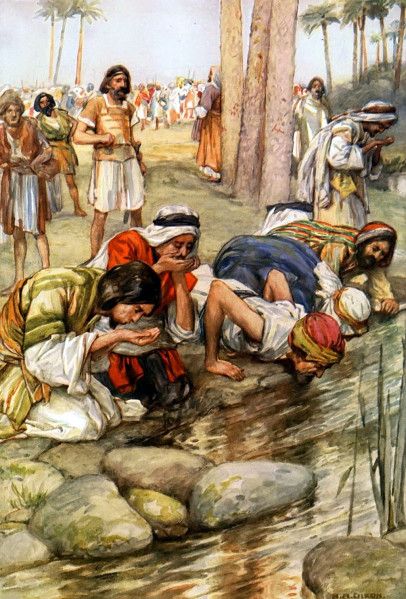
For most of us, the importance of bottled water or toilet paper lies not so much in the practical utility as in what each product symbolizes. Drinking water in the same "old" way we have been accustomed to for thousands of years - directly from natural sources - carries with it, on a more unconscious level, the understanding that this is a potential threat, either because of water quality or predators, which can hide at the source. At the same time, bottled water is the idea of direct access to the purity of nature, but in a civilized way - without any danger, without any effort (except for the financial one, a small one, by the way).
That is, both water and paper are symbols of urban life, of civilization - yet there is a huge evolution between the roller in the bathroom and the use of a moistened gosling or drinking pure water from a PET bottle compared to water mixed with mud or rust, chlorine. So, by stockpiling toilet paper and bottled water, the world did not try so much to take care of hygiene and health, as to preserve its status quo, the status of civilised human.
The importance of these two products indicates that the status of civilized man is probably at least as important as food provision. But this is just the beginning.
I think that each of us knows someone willing to give up the minimum comfort necessary in favour of their status in society. Some choose to occupy an important position at a job, even if because of this they cannot afford to feed well. Others surround themselves with symbols of abundance - luxury cars, expensive jewellery or haute couture clothing - even if this means sacrificing decent living conditions. And that seems to contradict Maslow's hierarchy of needs.
It appears that Maslow's categories are no longer strongly separated, and the "basic" needs are no longer limited only to physiological and safety, as we are accustomed to believing.
The very idea of security has been redefined. Knowing that you have a place to sleep and that no one is stealing your food supplies is no longer enough. Why? Because most of the goods are already "on-demand" - you don't make supplies for the winter in August, instead you make sure that you have a valid bank card, with which you can pay at the hypermarket or the courier service, online.
More frightening nowadays is to have a lower "rating" as an expert, which could cost you your job, that is why you constantly need new skills. And this is confirmed by the huge increase in demand for education that began with the quarantine - another sign that people probably feel professionally "endangered".
That is, both water and paper are symbols of urban life, of civilization - yet there is a huge evolution between the roller in the bathroom and the use of a moistened gosling or drinking pure water from a PET bottle compared to water mixed with mud or rust, chlorine. So, by stockpiling toilet paper and bottled water, the world did not try so much to take care of hygiene and health, as to preserve its status quo, the status of civilised human.
The importance of these two products indicates that the status of civilized man is probably at least as important as food provision. But this is just the beginning.
I think that each of us knows someone willing to give up the minimum comfort necessary in favour of their status in society. Some choose to occupy an important position at a job, even if because of this they cannot afford to feed well. Others surround themselves with symbols of abundance - luxury cars, expensive jewellery or haute couture clothing - even if this means sacrificing decent living conditions. And that seems to contradict Maslow's hierarchy of needs.
It appears that Maslow's categories are no longer strongly separated, and the "basic" needs are no longer limited only to physiological and safety, as we are accustomed to believing.
The very idea of security has been redefined. Knowing that you have a place to sleep and that no one is stealing your food supplies is no longer enough. Why? Because most of the goods are already "on-demand" - you don't make supplies for the winter in August, instead you make sure that you have a valid bank card, with which you can pay at the hypermarket or the courier service, online.
More frightening nowadays is to have a lower "rating" as an expert, which could cost you your job, that is why you constantly need new skills. And this is confirmed by the huge increase in demand for education that began with the quarantine - another sign that people probably feel professionally "endangered".
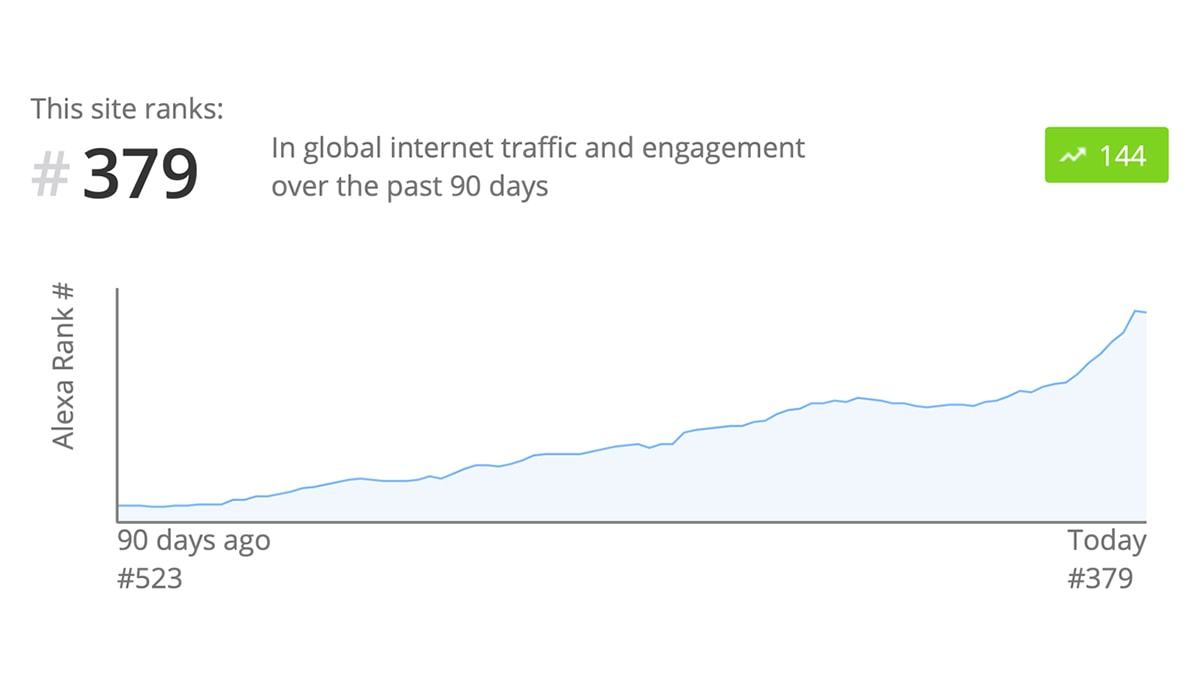
Another important detail is that entertainment has also become a basic necessity. One so important that we could place it in the first 2 levels of the Maslow's pyramid. In short - the brain is constantly looking for "primitive" dangers (the need to hunt, to gather, to find shelter, to guard against predators). But in the absence of real dangers, because this is what civilisation is for, the brain turns any appropriate stimulus into reasons for anxiety (harmful phenomenon), instead of fear (tool of survival). And to fight this stress, we try to deal with others. So, in times of crisis, people are spending money on Netflix, game consoles, home sports equipment or any other tools and activities that would allow them to be distracted from anxiety.
Another important detail is that entertainment has also become a basic necessity. One so important that we could place it in the first 2 levels of the Maslow's pyramid. In short - the brain is constantly looking for "primitive" dangers (the need to hunt, to gather, to find shelter, to guard against predators). But in the absence of real dangers, because this is what civilisation is for, the brain turns any appropriate stimulus into reasons for anxiety (a harmful phenomenon), instead of fear (a tool of survival). And to fight this stress, we try to distract, to take our minds off this. So, in times of crisis, people are spending time and money on Netflix, game consoles, home sports equipment or any other devices and activities that would allow them to be distracted from anxiety.
Another important detail is that entertainment has also become a basic necessity. One so important that we could place it in the first 2 levels of the Maslow's pyramid. In short - the brain is constantly looking for "primitive" dangers (the need to hunt, to gather, to find shelter, to guard against predators). But in the absence of real dangers, because this is what civilisation is for, the brain turns any appropriate stimulus into reasons for anxiety (a harmful phenomenon), instead of fear (a tool of survival). And to fight this stress, we try to distract, to take our minds off this. So, in times of crisis, people are spending time and money on Netflix, game consoles, home sports equipment or any other devices and activities that would allow them to be distracted from anxiety.
As a conclusion, ➤
It has become much more important to maintain at all costs the status of a modern, civilized man. And this status has, in fact, several important roles. The first and most obvious - it helps us have a good opinion of ourselves and, consequently, ensures us, at least partially, with "inner" peace. Another role - that of a "social tool" - a set of attributes, the purpose of which is to confirm to peers or to society that we respect modern living standards, that we meet the list of requirements necessary to be accepted into the caste of civilized people. After all, what's the point of surviving a disaster or crisis if the afterlife will be out of society or become primitive?
Are the experts right when they say that the demand for primary needs will increase in the crisis? Yes, but with the mention that the demand for "civilizational" goods will not decrease. Physical, basic needs intertwine with intellectual and emotional needs. The era in which we live and with which we have become accustomed no longer allows us to give up the status of civilized man.
Are the experts right when they say that the demand for primary needs will increase in the crisis? Yes, but with the mention that the demand for "civilizational" goods will not decrease. Physical, basic needs intertwine with intellectual and emotional needs. The era in which we live and with which we have become accustomed no longer allows us to give up the status of civilized man.
➤ a question
Now let's see what happens in practice.
Did you unsubscribe from Netflix or HBO? Or maybe you got a cheaper internet subscription? And you probably enrolled in another course on Coursera, or at least that came to mind. And the last time you went to the store or shopped online, what products did you choose? From the huge variety of products available, what pasta did you put in your basket? The cheapest (a rational decision in times of crisis) or Barilla? Because I couldn't find a single box of Barilla on the shelf.
Did you unsubscribe from Netflix or HBO? Or maybe you got a cheaper internet subscription? And you probably enrolled in another course on Coursera, or at least that came to mind. And the last time you went to the store or shopped online, what products did you choose? From the huge variety of products available, what pasta did you put in your basket? The cheapest (a rational decision in times of crisis) or Barilla? Because I couldn't find a single box of Barilla on the shelf.
Which brands will overcome this crisis? Not all, obviously. But those which will add to their real functional advantages an emotional utility, which will contribute to their consumer's emotional comfort, which is an advantage for his social status and, most importantly, will help him reassure his civilised status, will certainly increase their chances for success.


